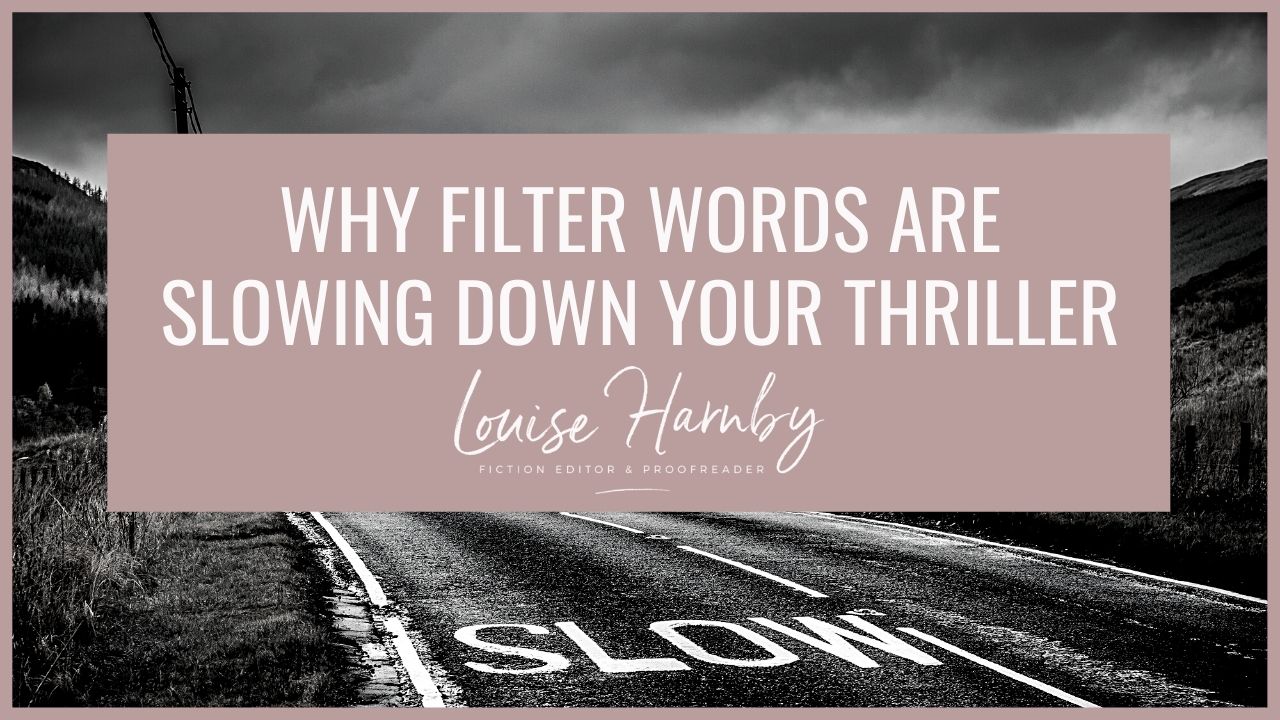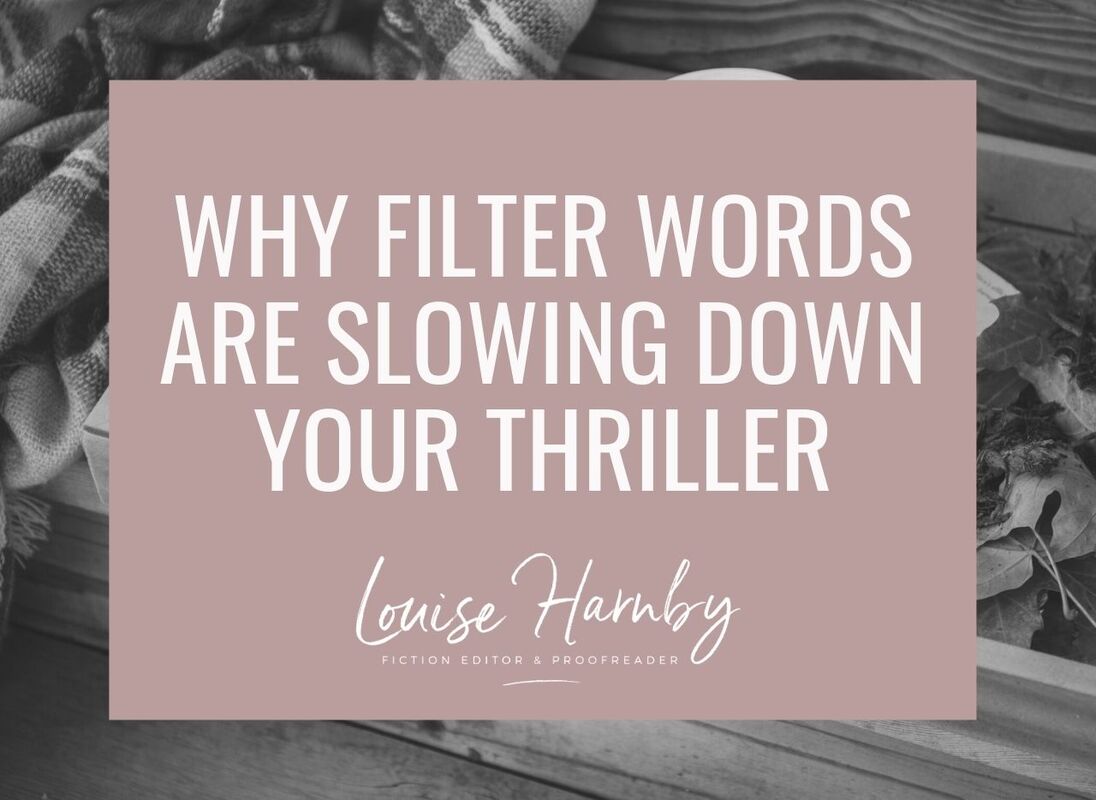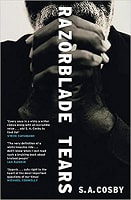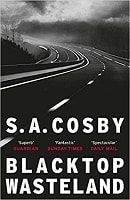|
Are your thriller’s sentences front-loaded with filter words? If so, you could be slowing your reader down. This post explains what filter words are, how they affect a sentence and how to decide whether to include them or ditch them.
|
|
Under normal circumstances he would never put his hands on a lady. However, these were not normal circumstances. Not by a long shot.
Ronnie struck the manager just above her right eye with the butt of the .38. A divot the width of a popsicle stick appeared above her eye. Blood spewed from the wound like water from a broken faucet. |
The filter words have gone, and with them the unintended pathological introspection, but the momentum is restored. We're in the moment with Ronnie as he lashes out. It's no less violent but the pace of the prose now mirrors the action authentically.
When filter words make space for reflection
Let’s take a look at another example from Cosby’s Razorblade Tears, this one also from Chapter 2.
The filter phrase is ‘looked at’, and it’s important. Ike is looking hard at what’s in front of him. As will be revealed later, this girl is his murdered son’s daughter. Ike recalls something he’d said to his son a few months earlier: ‘But that little girl, she gonna have it hard enough already. She's half Black. Her mama was somebody you paid to carry her, and she got two gay daddies. So now what?’
Ike and his wife will now be raising the little girl. Cosby wants to focus our attention inward for a moment on Ike’s reflection, and the filter word makes space for that.
While filter words can be effective when they’re used to create a sense of introspection, littering prose with them will be disruptive and pull the reader out of the viewpoint character's headspace. In other words, the psychic or narrative distance will be widened and we’ll feel disconnected from the immediacy of the character’s experience.
For that reason, always use filter words judiciously. In the above example, Cosby offers just a single nudge, and it’s enough.
Summing up
- When filter words front-load a sentence, they’re the first thing a reader notices.
- They destroy momentum and so are often best avoided in pacy action scenes, regardless of their position.
- And even if they do serve a purpose – focusing a reader’s attention inwards on how the viewpoint character acquires the experience they’re reporting (by looking, thinking, feeling etc.) – it's worth keeping their use to a bare minimum. One nudge will likely be enough.
Further reading
- For editors: Fiction editing learning centre
- For authors: Line craft learning centre
- Becoming a Fiction Editor (free booklet for editors)
- Blacktop Wasteland, Cosby, S.A., Headline, 2020
- Editing Fiction at Sentence Level (book for editors and authors)
- Filter words in fiction: Purposeful inclusion and dramatic restriction (blog post)
- Making Sense of ‘Show, Don’t Tell’ (book for editors and authors)
- Narrative Distance: A Toolbox for Writers and Editors (course)
- Razorblade Tears, Cosby, S.A., Headline, 2021
- Switching to Fiction (course for editors)
She is an Advanced Professional Member of the Chartered Institute of Editing and Proofreading (CIEP), a member of ACES, a Partner Member of The Alliance of Independent Authors (ALLi), and co-hosts The Editing Podcast.
- Get in touch: Louise Harnby | Fiction Editor & Proofreader
- Connect: Twitter at @LouiseHarnby, Facebook and LinkedIn
- Learn: Books and courses
- Discover: Resources for authors and editors
Leave a Reply.
BLOG ALERTS
TESTIMONIALS
Dare Rogers
'Louise uses her expertise to hone a story until it's razor sharp, while still allowing the author’s voice to remain dominant.'
Jeff Carson
'I wholeheartedly recommend her services ... Just don’t hire her when I need her.'
J B Turner
'Sincere thanks for a beautiful and elegant piece of work. First class.'
Ayshe Gemedzhy
'What makes her stand out and shine is her ability to immerse herself in your story.'
Salt Publishing
'A million thanks – your mark-up is perfect, as always.'
CATEGORIES
All
Around The World
Audio Books
Author Chat
Author Interviews
Author Platform
Author Resources
Blogging
Book Marketing
Books
Branding
Business Tips
Choosing An Editor
Client Talk
Conscious Language
Core Editorial Skills
Crime Writing
Design And Layout
Dialogue
Editing
Editorial Tips
Editorial Tools
Editors On The Blog
Erotica
Fiction
Fiction Editing
Freelancing
Free Stuff
Getting Noticed
Getting Work
Grammar Links
Guest Writers
Indexing
Indie Authors
Lean Writing
Line Craft
Link Of The Week
Macro Chat
Marketing Tips
Money Talk
Mood And Rhythm
More Macros And Add Ins
Networking
Online Courses
PDF Markup
Podcasting
POV
Proofreading
Proofreading Marks
Publishing
Punctuation
Q&A With Louise
Resources
Roundups
Self Editing
Self Publishing Authors
Sentence Editing
Showing And Telling
Software
Stamps
Starting Out
Story Craft
The Editing Podcast
Training
Types Of Editing
Using Word
Website Tips
Work Choices
Working Onscreen
Working Smart
Writer Resources
Writing
Writing Tips
Writing Tools
ARCHIVES
July 2024
June 2024
May 2024
April 2024
March 2024
October 2023
August 2023
July 2023
June 2023
May 2023
April 2023
March 2023
January 2023
December 2022
November 2022
October 2022
September 2022
August 2022
July 2022
June 2022
May 2022
April 2022
March 2022
February 2022
January 2022
December 2021
November 2021
October 2021
September 2021
August 2021
July 2021
June 2021
May 2021
April 2021
March 2021
February 2021
January 2021
December 2020
November 2020
October 2020
September 2020
August 2020
July 2020
June 2020
May 2020
April 2020
March 2020
February 2020
January 2020
December 2019
November 2019
October 2019
September 2019
August 2019
July 2019
June 2019
May 2019
April 2019
March 2019
February 2019
January 2019
December 2018
November 2018
October 2018
September 2018
August 2018
July 2018
June 2018
May 2018
April 2018
March 2018
February 2018
January 2018
December 2017
November 2017
October 2017
September 2017
August 2017
July 2017
June 2017
May 2017
April 2017
March 2017
February 2017
January 2017
December 2016
November 2016
October 2016
September 2016
June 2016
May 2016
April 2016
March 2016
February 2016
January 2016
December 2015
November 2015
October 2015
September 2015
July 2015
June 2015
May 2015
March 2015
February 2015
January 2015
November 2014
October 2014
September 2014
August 2014
July 2014
June 2014
March 2014
January 2014
November 2013
October 2013
September 2013
August 2013
June 2013
February 2013
January 2013
November 2012
October 2012
September 2012
August 2012
July 2012
June 2012
May 2012
April 2012
March 2012
February 2012
January 2012
December 2011
|
|
|



















 RSS Feed
RSS Feed





